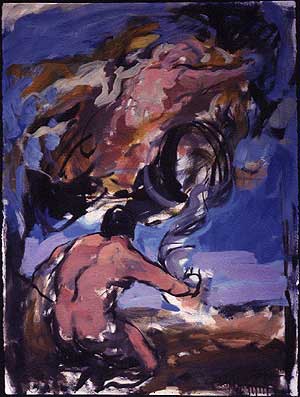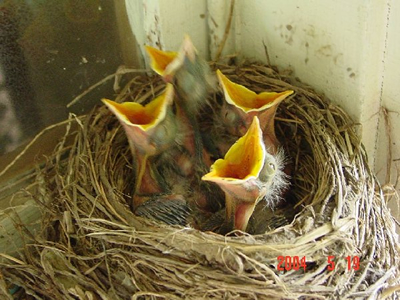2 Kings 2:1-2, 6-14
The passage from 2 Kings begins much as today's reading from Luke 9 (below). When YHWH was about to take Elijah up to heaven in the storm wind, Elijah and Elisha [his disciple] set out from Gilgal on a journey. Elijah asks his student to stay put, while Elijah goes on to Bethel. But Elisha replies to Elijah much as Peter does to Jesus, and with the same desire expressed by two of the would-be followers of Jesus in today's reading from Luke, "I will not leave you." So they continued along the road to Bethel, ... and then on to Jericho (2:4-5), and finally to the banks of the Jordan.

(Image source, http://www.ecva.org/exhibition/substance/images/knippers.jpg)
The connection between the Exodus of Elijah and that of Moses is cemented in Luke's gospel with the ministry of Jesus on the Mt. of Transfiguration, just prior to the passage we take up today (Luke 9:28-36). One similarity and a great difference between the departure of Elijah and that of Jesus is the effect it has on the disciples. The Spirit of Jesus does descend when the day of Pentecost "has fully come." And it descends with the promise of even greater works and the mantel of the authority of Jesus' ministry. But the journey of Jesus is not merely the journey of a servant of God. The Son of Man was God's own Son, and when we set out with him, it is the complete transformation of our lives and our world that ensues. It is we who are transformed.

(Image source, http://elaynelaporta.com/gallery/images/medium/ot_elijah-fiery-chariot_MED.jpg)
Luke 9:51-62

(Image source, http://ombudsben.files.wordpress.com/2009/10/foggy-boat-tall.jpg?w=500&h=878, blog article at http://ombudsben.wordpress.com/2009/10/27/obviously-confused-sometimes-sunk/)
Luke 9:51 begins with a time stamp, a captain's log. The days of (prior to, until) Jesus' "ascension" (lit. "taking up," analempsis) were filling up (sumpleroo). The latter verb is used three times by Luke, the first time in Luke 8, when Jesus falls asleep in a sailboat that is being swamped with water. The last time is on the Day of Pentecost (Acts 2:1), translated in the KJV as "when the day of Pentecost was fully come."
The days are filling up--they are coming fast and furious--for Jesus, with the riskiness of a boat filling quickly with water, but Jesus is master of both waves and days. There is no panic, only a firming, or fixing (sterizo), of his orientation toward Jerusalem. Luke has already told us (9:31) that Jesus' departure from Jerusalem will be his Exodus ('exodos). Like the book of Mark, the book of Luke narrates one deliberate journey from Galilee to Jerusalem, after which in one eventful week Jesus enters on Palm Sunday is killed on Good Friday and raised on Easter Sunday.

(Image source, http://www.ohiobass.org/StateTournaments/Erie/PIC-1.jpg, article, http://www.ohiobass.org/StateTournaments/Erie/Erie.htm)
Jesus sends ('apostello, from which we get apostle) messengers (angelos, angels; see Malachi 3:1 and 4:5, for the connection to Elijah) ahead into a Samaritan village to prepare the way ('etoimazo; see Luke 1:17, 1:76, and 3:4). Preparation is something the fool does to excess for himself (Luke 12:20), trying to preserve his own life, and preparation is something a servant dutifully performs for his master (Luke 12:47, 17:8). But in Jesus' vita, the notion of preparation seems to hover over that last week, the destination toward which he has now turned: the Last Supper with his disciples (Luke 22:9, 12-13) and his burial (Luke 23:56, 24:1). If there is foreshadowing about Jesus' death and resurrection in 9:51 it is strengthened by this command to the messengers in 9:52.
Jesus' reception (dechomai, or lack thereof) in this Samaritan town is something of a surprise, given the crowds that follow him (Luke 7:11, 8:4) and the many miracles he performs, though we have already seen some ambiguity and outright rejection of Jesus (8:37, even from the very beginning of his ministry in his own home town, 4:16-30, Fitzmyer, The Gospel According to Luke
James and John, those hotheads (Sons of Thunder, boanerges, in Mark 3:17), ask Jesus if they should call down fire from heaven to consume the villagers, presumably a heightening of the instruction they had been given in 9:5 because the offense is aimed not at disciples but at their Lord. (And/or it may be another allusion to Elijah's ministry and words, "let fire come down from heaven and consume you," 2 Kings 1:10, 12.) But Jesus turns around (strepho) and rebukes them ('epitimao, used in response to fever [4:39], demons [4:35, 41; 9:42], the storm wind [8:24]). In 9:20-21, Jesus has already "rebuked" the disciples after Peter's confession, commanding them not to tell anyone that he is the Christ.
Instead of calling fire from heaven, Jesus and his disciples simply leave the one Samaritan village (9:56) for another. The Son of Man, after all, has come to seek and to save (Luke 19:10), not to destroy. It is not clear whether Jesus and the disciples shake the dust of this town from their feet, but as they are walking along the road (toward Jerusalem), a new episode begins when an unidentified man says, "I will follow ('akoloutheo) you wherever you may be going" ('aperchomai). Jesus has already responded to similar initiatives, for example, the entreaty from the demoniac. Jesus sent the demoniac away, saying "go home" (hupostrepho, Luke 8:39) and tell what God has done for you. To this man who appears along the way to Jerusalem, Jesus gives a portrait of life as a disciple, which is borrowed from the world of nature:
Foxes (and their kits) have holes.

(Image source, http://calphotos.berkeley.edu/imgs/512x768/0000_0000/0408/0965.jpeg)
Birds (and their hatchlings) have nests.

(Image source, http://www.ornithology.com/images/BabyBirds_Miller_061705.jpg)
But the Son of Man (and his "followers" or "disciples") has nowhere to lay his head.
We are not told what this man decided about "following" Jesus further toward Jerusalem after this off-putting response by Jesus, but no sooner has this conversation concluded than Jesus takes the initiative and says to another man, "Follow me." Instead of responding with an immediate "yes," this man wants to "go home" like the demoniac to his family, not to spread the good news about what God has done, but to "bury my father." The question seems to be one of priority, of least and greatest, first and last; what comes first, the Kingdom of God or the cares of this world (Luke 13:30, 14:18, and the parable of the sower)? The second man's answer makes it clear that for him, responsibility to family comes before "following" Jesus on his way toward Jerusalem.
Then follows one of Jesus' most enigmatic sayings: "Let the dead bury their own dead" (Luke 9:60). But the upshot is clear: don't "go home"; instead, go announce the (good) news about the Kingdom of God.
Yet a third man says (like the first) "I will follow you, Lord" but (like the second) first let me go back ('epistrepho, similarly to the demoniac in 8:39) and say good-bye to ('apotassomai, foresake and give up, Luke 14:33) those at home. To this man, Jesus says, "No one who puts a hand on the plow and looks to the rear is useful for the Kingdom of God."

(Image source, http://www.wtpafm.com/morning/trucks/image004.jpg, blog http://www.wtpafm.com/morning/trucks.html)
So, are you on the road with Jesus, following closely, so that when the "fullness of time" comes you too will be with him in Jerusalem?
What road are you taking, a road of vengeance or of grace?
What time is it for you?
Do you feel your boat filling up?

(Image source, http://www.navalassoc.org.au/nautical%20compass011.gif)
What destination is your compass oriented toward? Do you have a solid fix on that location?
These are "homecoming" days as Jesus makes his way toward Jerusalem. He forgives a lack of hospitality in a Samaritan town and almost in the same breath refuses the requests of disciples for more space or time with parents and domestic chores. The reading from 2 Kings allows the contrast with Elijah's ministry and his treatment of Elisha, a disciple who is allowed to return home to "kiss" his parents goodbye before starting on the path of discipleship.




















